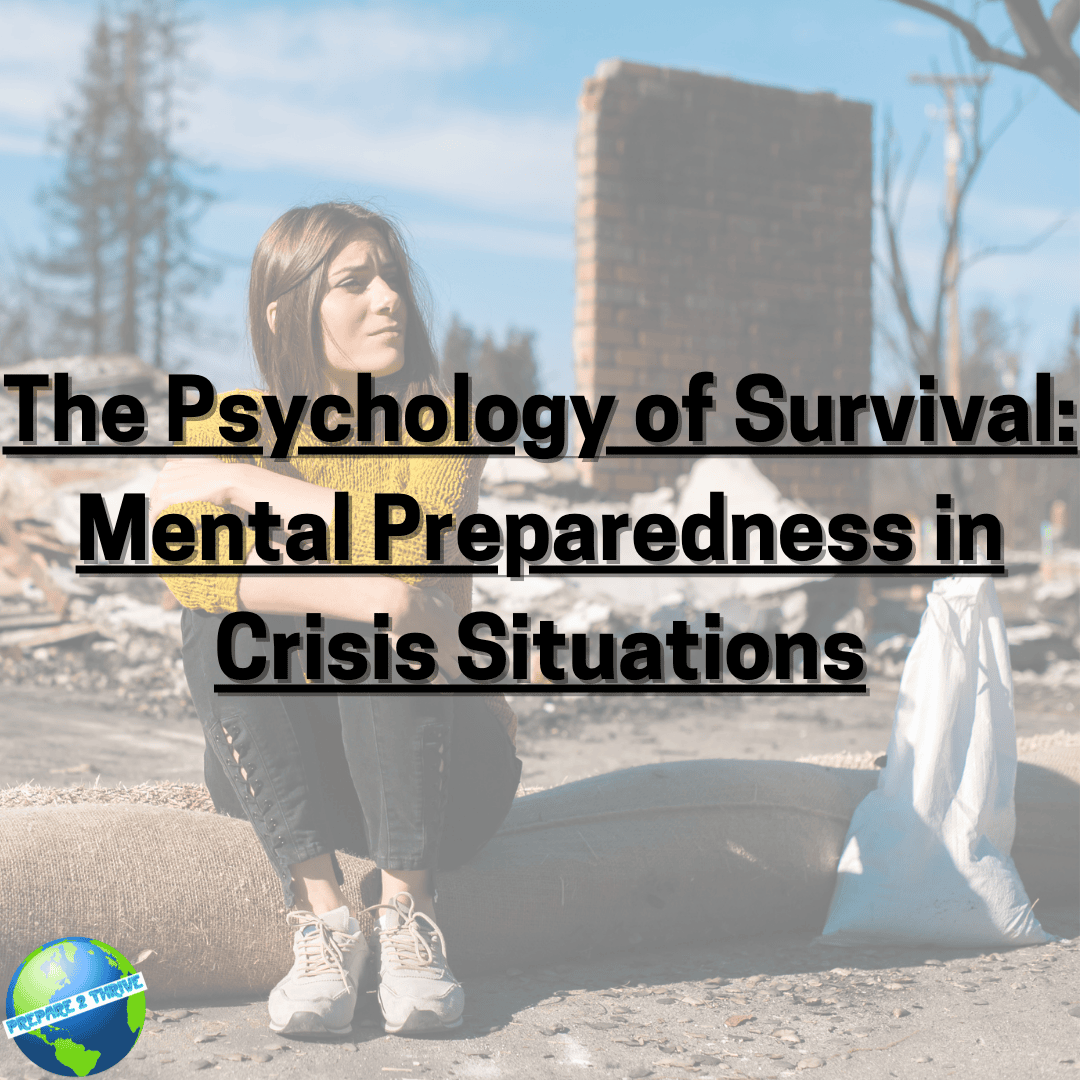 Survival situations can be incredibly challenging, both physically and mentally. When faced with emergencies, disasters, or life-threatening situations, it is not only our physical skills and resources that determine our chances of survival but also our mental preparedness. Understanding the psychology of survival and adopting effective mental strategies can make a significant difference in our ability to stay calm, make rational decisions, and overcome adversity. In this article, we will delve into the psychological aspects of survival and explore essential mental preparedness techniques to help you navigate crisis situations successfully.
Survival situations can be incredibly challenging, both physically and mentally. When faced with emergencies, disasters, or life-threatening situations, it is not only our physical skills and resources that determine our chances of survival but also our mental preparedness. Understanding the psychology of survival and adopting effective mental strategies can make a significant difference in our ability to stay calm, make rational decisions, and overcome adversity. In this article, we will delve into the psychological aspects of survival and explore essential mental preparedness techniques to help you navigate crisis situations successfully.
1. The Survival Mindset
In any survival scenario, maintaining a positive and resilient mindset is crucial. The survival mindset involves a combination of mental toughness, adaptability, and a strong will to survive. It is about cultivating the belief that you can overcome challenges and find solutions even in the most dire circumstances. Developing a survival mindset involves:
- Accepting the reality of the situation: Acknowledge the seriousness of the crisis and accept that you are in a survival situation. Denial or disbelief will only hinder your ability to make effective decisions.
- Remaining calm and composed: Panic can cloud judgment and lead to impulsive actions. Practice deep breathing, positive self-talk, and visualization techniques to stay calm and focused.
- Adapting to the changing circumstances: Flexibility is key in survival situations. Be open to adjusting your plans and strategies as new information or challenges arise.
- Setting achievable goals: Break down your survival objectives into manageable tasks. This helps maintain a sense of control and progress, boosting morale.
- Believing in your abilities: Have confidence in your skills, knowledge, and resourcefulness. This self-belief will drive your actions and problem-solving efforts.
2. Emotional Resilience
Survival situations often evoke intense emotions such as fear, anxiety, and despair. Building emotional resilience can help you navigate through these challenging emotions and maintain a clear mindset. Here are some strategies to cultivate emotional resilience:
- Recognize and accept your emotions: It is normal to experience a range of emotions during a crisis. Acknowledge your feelings and allow yourself to process them.
- Practice emotional regulation: Develop techniques to manage and regulate your emotions effectively. Deep breathing, mindfulness, and positive self-talk can help calm your mind and reduce anxiety.
- Foster optimism and hope: Maintain a positive outlook and focus on solutions rather than dwelling on problems. Visualize successful outcomes and remind yourself of past successes to bolster your optimism.
- Seek social support: Lean on your support network, whether it's friends, family, or fellow survivors. Sharing experiences and emotions can provide comfort and a sense of solidarity.
- Practice self-care: Take care of your physical and emotional needs. Prioritize rest, nutrition, and hydration to keep your body and mind functioning optimally.
3. Decision-Making Under Pressure
In survival situations, making sound decisions under pressure is critical. However, stress and uncertainty can impair judgment. To enhance your decision-making abilities:
- Assess risks and prioritize: Evaluate the risks and benefits of each decision before taking action. Focus on immediate threats and prioritize tasks accordingly.
- Use rational thinking: Avoid impulsive decisions driven by fear or panic. Analyze the situation objectively and consider the available options before choosing a course of action.
- Stay adaptable: Be prepared to adjust your plans if necessary. Embrace innovative thinking and consider alternative approaches to problem-solving.
- Gather information: Seek out accurate and reliable information to inform your decisions. Use your observation skills, listen to experts, and gather as much relevant data as possible.
- Trust your intuition: While rational thinking is crucial, don't ignore your gut instincts. Intuition can provide valuable insights and guide your decision-making process.
4. Building and Maintaining Relationships
Human connection and cooperation are vital in survival situations. Building and maintaining relationships with others can provide support, resources, and a sense of belonging. Consider the following:
- Establish trust and rapport: Be approachable, reliable, and empathetic. Foster open communication and show respect for others' opinions and experiences.
- Collaborate and share resources: Foster a spirit of cooperation and teamwork. Pooling resources and skills can increase your chances of survival and create a supportive community.
- Resolve conflicts constructively: Conflicts may arise due to stress and differences in opinions. Practice effective conflict resolution techniques, such as active listening and compromise, to maintain harmonious relationships.
- Provide emotional support: Offer a listening ear, encouragement, and empathy to fellow survivors. Emotional support can significantly impact morale and well-being.
- Stay connected: Establish communication networks and regularly check in with your support system. Share updates, information, and emotional support to strengthen relationships.
5. Adaptability and Resourcefulness
In survival situations, adaptability and resourcefulness are key attributes. Being able to improvise and make the most of available resources can greatly enhance your chances of survival. Consider these strategies:
- Think creatively: Look for unconventional uses for everyday objects. Foster a mindset of resourcefulness and explore multiple solutions to problems.
- Learn and acquire new skills: Expand your knowledge and skills in various areas relevant to survival, such as first aid, navigation, or fire-making. Acquiring new skills increases your adaptability and self-reliance.
- Maximize available resources: Prioritize essential resources such as water, food, and shelter. Use them efficiently and avoid wastage.
- Improvise tools and equipment: In the absence of specialized gear, find innovative ways to fulfill essential tasks. For example, using natural materials as shelter or fashioning tools from available objects.
- Stay mentally flexible: Be open to new ideas and approaches. Adapt your strategies as circumstances change and make the most of the resources at hand.
Conclusion
Surviving crisis situations requires more than physical strength and resources; it demands mental preparedness and resilience. By cultivating a survival mindset, developing emotional resilience, honing decision-making skills, building relationships, and fostering adaptability, you can navigate through the toughest challenges with greater confidence and effectiveness. Remember, mental preparedness is an ongoing process that can be developed and strengthened through practice and experience. Prioritize your mental well-being alongside physical preparations, and you'll increase your chances of survival in any crisis situation.
Hashtags: #PsychologyOfSurvival #MentalPreparedness #CrisisSituations #Resilience #Adaptability
